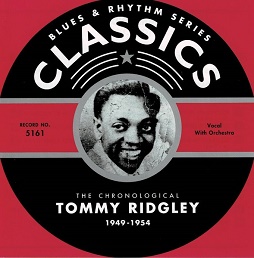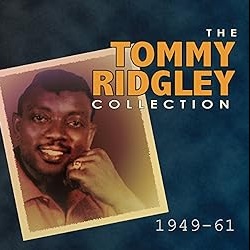Tommy Ridgley: “Boogie Woogie Mama”
11 Friday Dec 2020
Written by Sampson
Tags
No tags :(
Share it
IMPERIAL 5074; MAY 1950

Though he was the first artist signed when Imperial Records came calling in New Orleans seeking to establish themselves as a rock label, it quickly became obvious that Tommy Ridgley was destined to be overlooked, if not altogether bypassed, when the dust settled and far more talented and/or idiosyncratic artists followed him to the company.
But being somewhat ordinary by comparison to the assemblage of stars assembled around him doesn’t mean Ridgley was necessarily lacking in any way… other than sales that is, which of course is ultimately what did him in.
Any Old Guy In Town
Had the artists that Dave Bartholomew first recruited for Imperial Records when he was put in charge of their New Orleans endeavors been less impressive, Tommy Ridgley might’ve enjoyed a long fruitful career for the label.
Instead, once the ensuing Imperial releases by the likes of Jewel King, Fats Domino and Archibald all resulted in national hits right out of the gate it was bound to make the relatively meager returns on Ridgley’s first release, Shrewsbury Blues, seem a lot more futile than it really was.
Consequently Ridgley never was afforded a second session to try and improve upon his first outing and now, six months later, Imperial put the last sides from November out into the market just to clear room on their shelves.
Rather than serve as a career autopsy however, Boogie Woogie Mama, generic though it may be, shows that Ridgley had more than enough skills to be a welcome presence in rock ‘n’ roll.
Maybe he’d never be unique enough to stand out in a crowd like Fats Domino or Smiley Lewis (who while missing out on a national hit at least topped the regional charts with his first Imperial release), but Tommy Ridgley was exactly the kind of solidly dependable singer/songwriter who should fill out a record label’s roster to ensure they always had something with which to tout their company’s musical product to the masses.

Stacked Up From The Ground
When Bartholomew recruited him last November, 25 year old Tommy Ridgley was one of many singers around New Orleans subsiding on club work and hoping for a break. That’s not a hard thing for us to envision, especially in a location that was teeming with the kind of musical nightlife that The Crescent City was known for.
But what we don’t have a better idea of is just what those set-lists were comprised of before Ridgley got his first record deal. Was he singing other popular songs of the day because they were familiar and well-constructed and thus would have a better chance of going over well with audiences, or was he trying to come up with original material and hoping that it’d be well-received enough to keep him working?
We can’t really be sure. The reason this is important to know however is in trying to figure out how much time he’d had to put together original songs to record when he DID get signed… whether he’d been writing before this and if they’d been road-tested to gauge their response and fine tune them when necessary.
Boogie Woogie Mama is the kind of straightforward by-the-numbers song that Ridgley could’ve easily written on the spur of the moment the day before entering the studio at the end of the November. There’s no deep story-line and it contains easily recognizable sentiments that could be used interchangeably for almost any song or structure.
Yet it’s also got an effortless charm and energy to it which sounds so natural that you’d hardly be surprised to find out he’d been churning this out on stage for a year and getting consistently good responses for it.
According to Ridgley (though he didn’t comment on this song in particular) he wrote both sides of his first single in the studio itself, so chances are this was worked up in much the same way as it was cut at the same date. Now Tommy turned out to be a pretty good songwriter as he’d continue to show over the years, but that tells us that it’s likely that Dave Bartholomew had a hand with this cut – at least in getting it into shape – which might help to explain its efficiency.
In The Morning And Late At Night
As you can probably guess by the title this is a no-frills fast-paced boogie that relies on horns, piano and a simple and steady rhythm section to set the pace and allow Ridgley to ride the wave from the start to finish.
The arrangement itself is incredibly tight behind Ridgley’s vocals, the horns are locked in and providing the high-octane fuel while everything else is steering the vehicle, keeping things on the right track. It’d almost be difficult for Tommy to screw it up because there’s no room for him to improvise even a little. As such his vocals have no choice but to pick up the proper cadence and his enthusiasm does the rest.
Where things do get away from them all just a little is in the break, the one thing which of course wasn’t written out with the same rigid focus as the primary track. Instead we get a sax solo that is a little more quirky and erratic than is necessary, trading in the insistent driving rhythm the song was thriving on for something that’s harder to follow.
The drums along with the other horns try and keep Boogie Woogie Mama from wandering too much and make up for the drop in energy as best they can, but it becomes a waiting game as you can’t help but look forward to Ridgley’s return so it get fall back into line.
When he does re-appear you slip right back into the mindset you were in to start with as he barrels along confidently, tossing in a few good lines and basically just keeping everybody spirits up. Though it might’ve been conceived on demand in a break during recording, thrown together by cribbing well-worn stanzas from a thousand other songs and tying it in with a head arrangement the musicians had been playing for years, it doesn’t sound any worse for the ware.
It’s a perfectly representative rock song that works as well on record as it would in a club… hardly a potential hit single nor the show-stopper on stage, but something that neither constituency would ever complain about hearing.

Out Of My Sight
After Imperial let him go when this didn’t draw much interest Tommy Ridgley bounced around for years, signing with some notable companies (including a return to Imperial down the road) with plenty of decent records along the way that couldn’t turn enough heads for him to ever become even a fleeting star.
Boogie Woogie Mama is indicative of his career made up of consistently middling returns. It’s generic to a fault, but skillfully navigated by Ridgley… it’s decidedly unambitious in concept but perfectly suitable all the same… it’s ultimately fairly forgettable as a record, yet consistently enjoyable as it plays.
Unfortunately there’s no rewards in music for simply showing up, doing your job and going home, at least not for those on the front lines. Essentially Tommy Ridgley might’ve been best described as an ideal session musician… or rather a session vocalist… someone who could handle the songs slated for a studio date, play his part well and cause the producer no problems along the way, but who was never going to be able to fully carry the record. He was a piece of the larger machinery, a foot soldier, not an officer who got the promotions, fancy ribbons and battle stars.
You’d think that might make him invaluable in an industry where consistent output was of the essence, but when singers were being judged based largely on sales and the commotion their live appearances caused, those same reliable but unexceptional traits ultimately made him somewhat expendable.
Nobody ever said this game was fair.
SPONTANEOUS LUNACY VERDICT:

(Visit the Artist page of Tommy Ridgley for the complete archive of his records reviewed to date)
